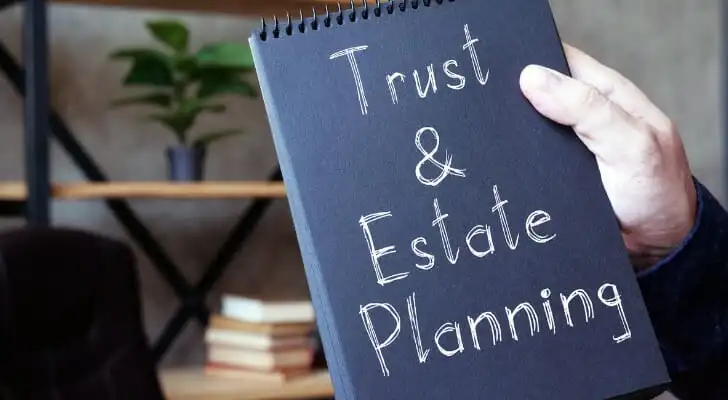Trusts and estates are the two main legal structures for transferring assets to your heirs and beneficiaries. Each works in critically different ways. Estates make a one-time transfer of your assets after death. Trusts, meanwhile, allow you to create an ongoing transfer of assets both before and after death. You may want to consider working with a financial advisor as you plan your estate and weight the merits of trusts.
What Is an Estate?
An estate is everything that you own when you die. This does not include anything held jointly with someone else. Nor does it include anything that you have transferred or otherwise assigned by the time you die. Your heirs include anyone who receives money, belongings or other assets from the estate.
For example, if you die before your spouse, the house you and your spouse own together doesn’t become part of an estate; it would belong solely to your spouse. Nor would anything you might have given away before your death. Your estate would only include anything you independently own at the time of your death.
An estate is also temporary. It exists to make a one-time distribution of the assets of the deceased. Once those assets have been disposed of, the estate no longer exists. This does not mean, however, that an estate is necessarily short-lived. Some estates can last for years if that’s how long it takes to make a final distribution of all assets.
How Are Estates Distributed?
An estate can be distributed in two main ways: by will or by legal chain of inheritance.
A will is a series of instructions for who should get the assets of an estate and how those assets should be distributed. If the decedent (a legal term for a person who died) has a valid will at the time of death, the estate is distributed under those terms.
When someone dies without a will, this is known as dying intestate. In this case, their assets will be distributed according to state law. Most of the time this means that the decedent’s assets go directly to their next of kin. In most states, spouses claim priority in this line of inheritance, followed by children, then parents and then extended family.
One of the most common misunderstandings regarding an estate is how much control someone has over the terms of his or her will. While state law governs who inherits when someone dies intestate, most states have very few restrictions on how an executor can distribute assets through a will. When you die, you are mostly free to leave your belongings to whoever you choose.
Costs and Taxes Associated With Estates
Before anyone can inherit, however, an estate has to resolve three main obligations:
- Existing debts
- Estate taxes
- Costs, fines and fees
When someone dies, creditors and bill collectors have first claim on the assets of the estate. The estate pays all debts owed by the dead person before anyone else can inherit. This can involve selling off property if the deceased didn’t have enough cash to pay bills. If those bills are larger than the estate itself, the heirs receive nothing.
In addition, when someone is wealthy enough, the person’s estate can trigger dedicated estate taxes.
Estate taxes are assessed based on how much an heir has received, and they require a high level of wealth. In general, for an individual, estate taxes do not apply in 2026 unless you have inherited more than $15 million ($30 million for a couple filing jointly). This includes not only cash but also the value of any property or other assets.
Under the One Big Beautiful Bill Act (OBBBA), the lifetime exemption increased from $13.99 million per person to $15 million per person starting in 2026, and is then indexed for inflation.
It’s also important to understand that heirs themselves do not pay estate taxes when they inherit property. If the estate is large enough to owe taxes, those amounts are paid directly from the estate before any distributions are made, and any administrative or management costs are also covered by the estate.
An estate can trigger any number of different potential costs. For example, if the terms of a will are overseen by a lawyer, that attorney will bill his or her legal fees directly to the estate. If an estate requires management, someone may be named its executor. This is someone whose job it is to distribute assets according to the will’s instructions, pay any bills, and otherwise manage the distribution of assets.
Depending on the workload, the executor may bill the estate for his or her time. Or, if an estate is large or complex enough, a probate court judge may oversee the distribution of assets. Court costs and fees are drawn from the estate.
What Is a Trust?

A trust is a legal entity that holds and distributes assets according to certain conditions. The person who creates the trust, who is known as the “grantor,” can establish those conditions largely at will. A trust exists independently of the people who created it and receive funds from it. Any assets belong to the trust itself until they are distributed. There are three basic steps to creating a trust:
- First, as the grantor you create a pool of assets.
- Second, you hand those assets over to a third party to manage and oversee. This third party is known as the “trustee(s).”
- Third, you identify the people who can receive the trust’s assets based on certain terms and conditions. These people are known as the “beneficiaries.”
For example, say you’ve accumulated substantial wealth and want to ensure an education for the next generation of your family. You might set up a trust along the following lines:
- As the grantor, you would place $5 million in an account.
- The account would be overseen and managed by its trustee, who in this case is your lawyer.
- Any child, niece and nephew of yours are named as the beneficiaries. They can draw on the account to pay tuition for any college or university.
Under this trust, your family members can now draw upon the money to pay for college tuition, but nothing else. You haven’t simply given them a pot of money. The gift has conditions. Your lawyer, as the trustee, has the job of making sure your beneficiaries meet those conditions. It will be their job to make sure that your family members have applied to actual colleges and aren’t just scamming the trust.
Your lawyer, as the trustee, is also responsible for financially managing the trust. They will oversee its investments, banking and other administrative matters. Like an estate, a trust draws its costs from itself. The trustee will bill the costs of their time to the trust itself. If your lawyer needs to hire any accountants, investigators, or any other related services, they would bill those costs to the trust itself, as well.
Unlike an estate, you can set up a trust even while you’re still alive. If you had written that $5 million grant into your will, none of your family members would get the tuition money until after your death. By creating a trust, you ensure that they can receive the money even while you’re still alive. This is called a living trust.
However, like an estate, a trust survives its creator’s death. When someone does this, the trust does not become part of their estate. Instead, the trust is a legal entity on its own. When the grantor dies, the trust continues on until it either runs out of assets or its terms dictate otherwise. For example, a trust might say, “After 50 years dissolve the trust and distribute any remaining assets among living beneficiaries.”
Types of Trusts and How They Work
Living trusts are common ways for families to pass down land, heirlooms, and other significant assets. It allows property to belong to the family in general, even if it is held and used by any one individual at a time. Living trusts also mean that assets can avoid probate court and even estate taxes depending on how the trust has been established.
Most trusts are what is known as a revocable trust. This means that the grantor can still control, change and even rescind the trust at will. Ultimately the person still owns the assets, the trust just manages those assets for him or her.
An irrevocable trust is the opposite. Under this setup, the grantor cannot control, change or rescind the terms of the trust. Once it is created the trust belongs to its beneficiaries, even though they must still meet its terms or conditions.
While trusts and estates both exist to distribute assets, they do so in very different manners. A trust can be created while the grantor is alive, while an estate is created at the moment of someone’s death. A trust is intended to be a semi-permanent entity. It exists to distribute assets over time according to a series of rules and conditions, overseen by a trustee. An estate is intended to be temporary. It exists to make a one-time distribution of assets, after which it will no longer exist.
An estate exists whether you plan for one or not. However, you can structure your estate by writing a will, which dictates who gets your assets and how. A trust has to be specifically created. Once a trust has been created it, too, dictates who gets your assets and how.
When to Use a Trust vs. Will
A will-based estate plan may be enough if your estate is small, your assets are simple, and your state offers a quick probate process. A will can direct who gets your property and name guardians for minor children without the cost of creating and managing a trust.
A trust may be more useful if you want to avoid probate, add conditions to how and when heirs receive assets, or provide ongoing financial support over time. Trusts can also help if you own property in multiple states, have a blended family, or want to protect assets from creditors or future lawsuits. Because trusts can be managed while you’re alive and continue after your death, they offer more control and flexibility than a will alone.
Some people use both a trust and a will in the same plan. The trust can hold major assets like a home, investments, or business interests, while the will covers smaller possessions and names guardians. This approach can ensure that your main assets avoid probate, while still giving instructions for anything not placed in the trust before death.
Your choice depends on your personal situation, the size and type of your assets and how you want them passed on. If you’re unsure, a financial advisor or estate planning attorney can help you weigh the costs, benefits and legal requirements for each option. Using the right structure (or a mix of both) can help you protect your assets and carry out your wishes.
Bottom Line

Trusts and estates are the two most common mechanisms for passing down assets. An estate is everything that you own at the moment of your death and is subsequently passed on to your beneficiaries. A trust is a legal entity that can exist for generations and distributes assets according to a series of rules and instructions. The right one for you will depend on your unique situation.
Estate Planning Tips
- Estate planning can be complex and nuanced, so having a professional guide you through the process can be valuable. Some financial advisors specialize in this type of planning. Finding a financial advisor doesn’t have to be hard. SmartAsset’s free tool matches you with vetted financial advisors who serve your area, and you can have a free introductory call with your advisor matches to decide which one you feel is right for you. If you’re ready to find an advisor who can help you achieve your financial goals, get started now.
- SmartAsset’s retirement calculator can give you a good estimate of how you are doing in reaching your financial goals.
Photo credit: ©iStock.com/kWaiGon, ©iStock.com/Andrii Dodonov, ©iStock.com/FatCamera
